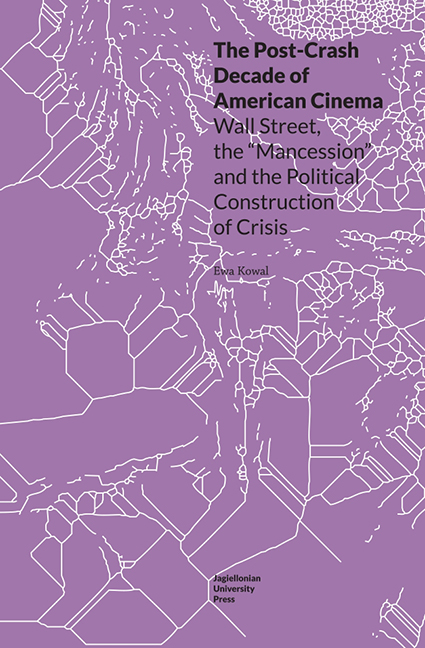 The Post-Crash Decade of American Cinema
The Post-Crash Decade of American Cinema Published online by Cambridge University Press: 05 May 2023
In the autumn of 2008 I began writing my PhD dissertation about early Western (mainly American) literary responses to the September 11, 2001 terrorist attacks in the US. Working on over a dozen post-9/11 books (mainly novels), I would watch the news on TV, listen to online radio, and read online articles about the current events; I would hear about the financial crisis in the US and in a number of European countries and about apocalyptic scenarios resulting from abstract statistics. But I was too busy trying to catch up with the previous major event in the US and its global consequences to pay much attention, which was also possible thanks to living on the “green island” of Poland (apparently “the only European country not to suffer recession during the financial crisis” [Reuters 2016; Tooze 2018: 227]). After the PhD dissertation became a book, and it was time to start working on a new one, I knew what it would be about: the next “big thing” – the 2007/8 financial crisis, its aftermath and their (Western) cultural representations.
Of course, in broader reality, the connections between 9/11 and the 2007/8 financial crash and the ensuing Great Recession were much more important and serious than the above personal anecdote. Unlike the “early” mainstream literary responses to 9/11 which I analysed, focused mostly on individual trauma of Western, white, middle-class people – predominantly men – and their private coming to terms with “the changed world,” later responses to the terrorist attacks increasingly widened the perspective. Just like the first critical responders before them, i.e. the feminist critics of the George W. Bush administration and its reaction to 9/11, such as Susan Sontag (2001) and the contributors to Aftershock: September 11, 2001: Global Feminist Perspectives (edited by Susan Hawthorne and Bronwyn Winter, and first published in 2002), in time novelists and playwrights began to combine their discussions of transnational fundamentalism and terrorism with a critical analysis of global capitalism, and the role of the American superpower within it. As the housing bubble burst in the US in 2007, when Barack Obama was already campaigning for the presidential election the next year, Mohsin Hamid published his novel The Reluctant Fundamentalist (2007), followed by Teddy Wayne's novel Kapitoil (2010) and Ayad Akhtar's play The Invisible Hand (2014).
To save this book to your Kindle, first ensure no-reply@cambridge.org is added to your Approved Personal Document E-mail List under your Personal Document Settings on the Manage Your Content and Devices page of your Amazon account. Then enter the ‘name’ part of your Kindle email address below. Find out more about saving to your Kindle.
Note you can select to save to either the @free.kindle.com or @kindle.com variations. ‘@free.kindle.com’ emails are free but can only be saved to your device when it is connected to wi-fi. ‘@kindle.com’ emails can be delivered even when you are not connected to wi-fi, but note that service fees apply.
Find out more about the Kindle Personal Document Service.
To save content items to your account, please confirm that you agree to abide by our usage policies. If this is the first time you use this feature, you will be asked to authorise Cambridge Core to connect with your account. Find out more about saving content to Dropbox.
To save content items to your account, please confirm that you agree to abide by our usage policies. If this is the first time you use this feature, you will be asked to authorise Cambridge Core to connect with your account. Find out more about saving content to Google Drive.